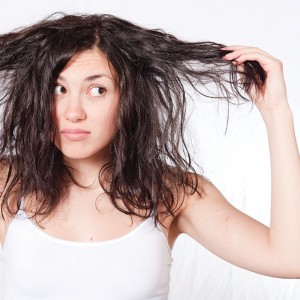 Did you know that hard water’s effects go far beyond chalky buildup, pipe damage and higher energy bills? That same water may also be doing a number on your hair. Learn more about some of the quick remedies and find a permanent solution to better hair days.
Did you know that hard water’s effects go far beyond chalky buildup, pipe damage and higher energy bills? That same water may also be doing a number on your hair. Learn more about some of the quick remedies and find a permanent solution to better hair days.
Could hard water be hurting your hair?
Have you tried every hair product under the sun but still have dry, limp, dull or unmanageable hair? Or what about your hair color? Does it seem to have an orange, green or brassy tint or look faded within a few days of spending a small fortune at the salon? If you’ve noticed any of these problems, hard water may be the culprit.
How the damage is done
The minerals found in hard water (calcium, magnesium and iron) can affect your hair, making your products less effective and your hair more difficult to manage. Just like the scale build-up that forms on your shower doors, faucets and in your pipes, these hardness minerals also build up on your skin and hair. This build-up on the hair can leave it feeling dry and weighed down. Additionally, these minerals combine with your natural oils and can leave a greasy feeling at the scalp. Hard water also makes shampoos, styling products and chemical services less effective because the minerals in the water react with the ingredients in your hair products. This results in less lathering and ineffective cleansing and the inability of conditioners to penetrate the hair follicles (feels dry at the ends). It may even relax your perm.
Four fixes for hard water hair
If you suspect that your hard water is affecting your hair, here are a couple of fixes to bring your strands back to life:
- Apple cider vinegar (ACV). ACV can reverse the effects of hard water on hair in the short term. ACV acts as a hair clarifier, removing build-up while maintaining hair’s color and shine. After you shampoo and rinse, do a final rinse with the ACV to get rid of hard water minerals.
- Chelating or clarifying shampoo. This type of hair cleanser is designed to remove heavy build-up. Because this type of shampoo can strip your hair of its moisture, it’s recommended to keep use to once a week, and add an intense moisturizing conditioner to your daily routine to keep your tresses hydrated.
- Lemon or lime rinse. The juice from lemons (or limes) can reduce the dullness created by hard water and the soap residue that is left behind. Ridding your strands of that build-up will leave your hair shinier, and as an added bonus, lemon juice can help minimize dandruff as well. Simply combine two tablespoons of lemon juice with one cup of warm water, and pour it slowly over your hair after shampooing. Allow it to sit for at least a minute before rinsing it out completely.
- Water softener. This appliance is a permanent fix that will keep your locks looking vibrant and healthy (no build-up!) while saving you money (less spent on shampoo, conditioner and styling products!). By installing a softener, hardness minerals are removed before water even gets to your showerhead, so you never have to experience dull, limp hair again.
The softening solution
ACV, special shampoos and lemon rinses are great ways to help your hair in the short term, but you’ll never truly be in the clear. A water softener provides 24/7 relief to your household—and hair. An easy first step to get you on your way to softer, healthier hair is by ordering a hard water test strip. Once you’ve tested your water and know your hard water number, you’ll be ready to find the best water softening solution for your needs.

